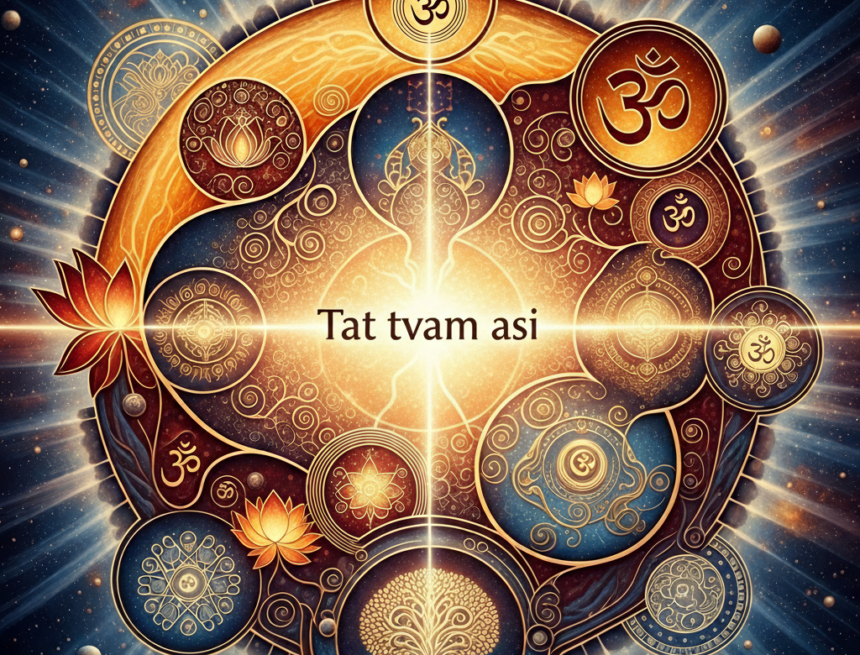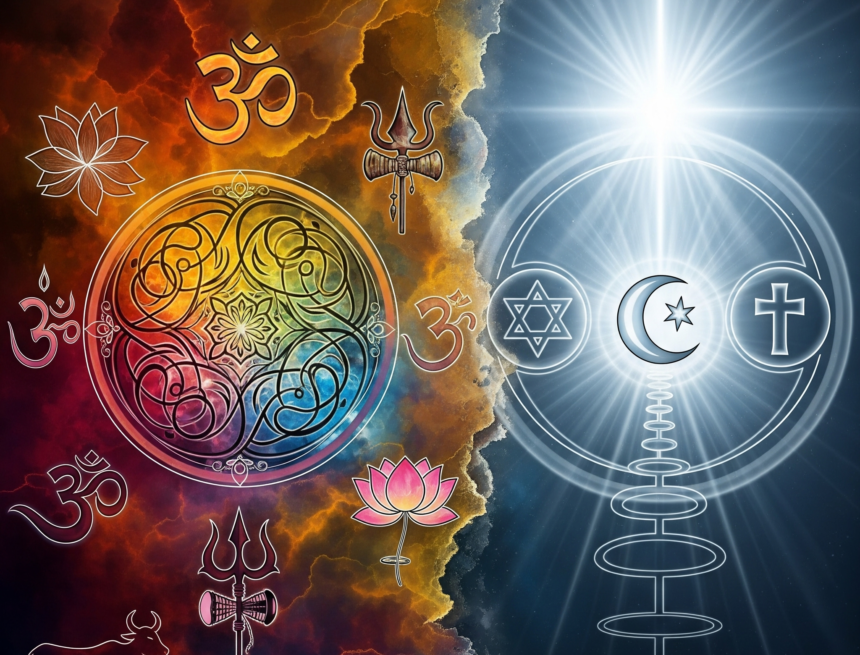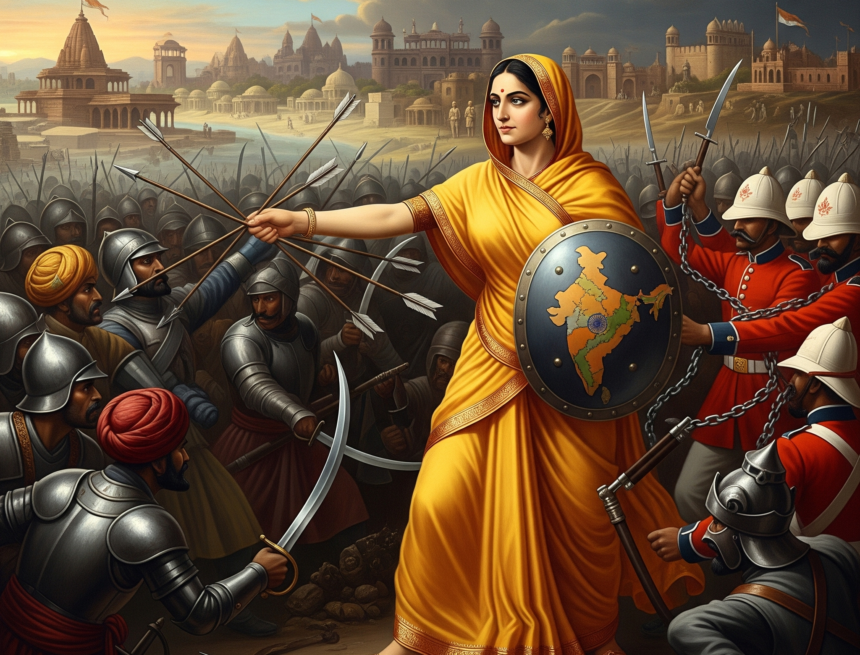A cobra once promised a Sadhu never to bite, only to be beaten by villagers who mistook its restraint for weakness. The Sadhu reminded it: “I asked you not to bite, but did I ask you not to hiss?” The parable mirrors Hindu society’s larger civilizational problem of mistaking non-violence for inaction in the face of aggression. True Ahimsa was never about surrender — it was resistance rooted in Dharma, with Shatrubodh (enemy-awareness) as its guiding strength.
Latest Posts

That! Who or What is Worth Worshipping?
In post-Christian Europe, many no longer subscribe to traditional theology or atheism, instead calling themselves “Something-ists” or “spiritual but not religious.” This vague belief in “Something” echoes ancient Indian thought, where the Vedic word Tad—“That”—points to the Absolute beyond description. Found in the Ṛg-Veda, Upaniṣads, and Bhagavad Gītā, Tad represents the witness-consciousness, the essence beyond qualities. The clearest enunciation of Tad, at once one of the profoundest Vedic phrases is the assurance Tat tvam asi, “that thou art” in the Chāndogya Upaniṣad. Thus, what seems modern is rooted in one of humanity’s oldest insights into the ultimate reality.

Dharma and Development : A Civilizational Balance
When development is not rooted in culture, a nation is reduced to just a geographical landmass. Development and culture are not mutually exclusive in the Indian civilizational context. Sanatana Dharma doesn’t ask us to choose between development and devotion to faith — it asks us to integrate them. Its Purushartha framework enables human fulfillment in every aspect of life, with Dharma as the guiding principle. From the Ram Mandir to the Kumbh Mela, what critics dismiss as distractions are often engines of economy, culture, identity, and belonging.

Secularism in India – Rooted in Sanatana Dharma
India's secularism is grounded in the civilizational ethos of Sanatana Dharma and emphasizes mutual respect over strict separation of state and religion. Sanatana Dharma doesn’t just preach tolerance and inclusivity; it embodies it. Unlike Western secularism, which arose from religious conflict, India’s approach fosters coexistence. India's secularism is not just political, it is civilizational.

Tirupati – A Sacred Legacy of Devotion and Divine Grace
Nestled in the sacred hills of Tirumala, Tirupati is more than a pilgrimage — it is a living legacy of devotion and divine grace. From ancient Pallava endowments to the grandeur of the golden roof of the sanctum sanctorum donated by Krishna Deva Raya, its history is etched in every gopuram. Always reverbating with the chants of “Govinda”, for millions in South India, it is not just a temple, but an inseparable part of life’s journey.
Daily Feed
Our Civilizational Imprints From Bharat To Japan: Limiting Boundaries Is Relinquishing Cultures
From the ancient times till present-day diplomacy, civilizational exchanges and acculturation have played a significant role in establishing and renewing inter-nationstate relationships. This article explores the relationship between Bharat and Japan within the purview of civilizational linkages and thus highlights upon the reach Bharat, as a civilization, has on the cultural land of Japan.
Gainsaying Ancient Indian Science – Part 1
As the source of many great scientific achievements, Indians are still denied their place in history; especially by homegrown critics.
A Tale of Two Resurrections
Ilayaraja's view on the resurrection of Jesus Christ compared to his beloved Ramana Maharshi has sparked debate.
The Eteranal Dasas of Sree Padmanabha Swamy – V (Making of Modern Travancore – Continued)
The modern state of Kerala owes a lot to the past rulers of the region.
Nalanda – The greatest university of its time
The ruins of ancient Nalanda university take us back to a long forgotten era that was symbolic of free thinking and intellectual excellence.
Why Swadeshi Indology?
Indians must take ownership of their own culture and heritage if they are to prevent it from getting digested and distorted by scholars who have no inkling of the real ethos of our tradition and who use alien theoretical approaches to interpret Indian texts.
Śaṅkara Charitam – a re-telling – Chapter-12 – Śivaḥ kevalo’ham
Chapter 12 of Śaṅkara Charitam takes us through Śaṅkara’s meeting with his Guru, and the Guru's acceptance of Śaṅkara as his disciple.
Govinda Bhagavatpāda asks the boy standing at the foot of the cave, inside which he meditated for centuries, to introduce himself and Śaṅkara calls himself - "Śivaḥ kevalo’ham".
The life of Gauḍapāda as a Brahmarākṣasa and his meeting with Govinda Bhagavatpāda is also mentioned in this chapter.
Śaṅkara Charitam – a re-telling – Chapter-11 – Patañjaliṃ-Gaudam-Govindaṃ
The boy Śaṅkara continues on his path, in search of his Guru. Meanwhile, Patañjali Mahaṛṣi, who is Śānta-svarūpa of the ugra-rūpa of Ādiśeṣa, aims to teach a thousand students at once; and places two conditions in front of his students. Both conditions are violated by his students, and the aftermath and its ramifications on the journey of Śaṅkara are discussed.
The Purpose of Defending Dharma
Dharmic principles form the bedrock upon which Indic civilization has thrived and hence need to be propagated as well as defended.
Sex Slavery In Islamic India
Enslavement of women, children and men, followed by their sexual exploitation was an integral part of the Muslim rule in Medieval India.
Śaṅkara Charitam – a re-telling – Chapter 04
Darkness and light; When the lion roars, even the elephants retreat.
Book Review: The Āśrama System: The History and Hermeneutics of a Religious Institution
Sukrit Banerjee's review concisely outlines Patrick Olivelle's findings on the evolution of the Āśrama System.
Daily Feed
When Scientism Overshadows Science: An Orthodox Critique of the Sophistry of Evolutionism
"It is a modern tendency within religious factions to seek a synthesis and synchronization between the domains of Religion and Science. This inclination manifests in the attempts of forceful amalgamation of both domains, with the rejection of traditional interpretations of Religion and deliberate efforts to reformulate it to seamlessly align with the framework of Science."
Agastyas
Agastya Muni, as well as his lineage, had a tremendous influence on Indic civilization which stretched all the way to Southeast Asia.
Vena, Veda, Venus
Many scholars starting with Tilak have suggested that Vedic Vena is Venus but this identification has been disputed.
Sister Nivedita’s gifts
Sister Nivedita’s far reaching contributions to India’s revival came in fields as diverse as politics, spirituality, science and art.
Kalasa Pujan: Its Meaning, Significance And Other Sacred Constituents
As we invoke Brahmā at the base, Rudra at the neck, and Vishnu at the face of the 'kalasa', we thus worship three aspects of creation, dissolution, and sustenance.
Buddha, Caste and Environment
The Buddha realised that the future of any civilisation depended on its relationship with Nature.
Decolonising the Indian Education System – Why Our Approach is Flawed
Recent efforts to decolonise the Indian education system, particularly through rewriting NCERT textbooks, focus on reclaiming India's intellectual heritage by infusing indigenous knowledge into the curriculum. However, merely altering content without changing the deeper intellectual foundations upon which it rests will only result in superficial change. True decolonisation demands a shift from western frameworks of how we teach, learn and evaluate knowledge, to genuinely embrace India's philosophical and cultural traditions at every level of education.
When should Pongal/Makar Samkranti be celebrated and why?
An incomplete understanding and misreading of the Shastras in the modern age, has led people to celebrate Pongal on the wrong day.
Ram Temple and the ‘Idea of India’
In this first of a two part interview, we speak with Dr Koenraad Elst about his areas of research, his books and his interest in Indian history, triggered by the politics around the Ram Temple in the late eighties.
The Vicissitudes in Vision: A Commentary on “Ideas Have Consequences”
Sai Alluri reviews the book “Ideas Have Consequences”, a philosophical classic authored by Richard Weaver in which he diagnoses the challenges of modern age. Sai Alluri talks about how the author investigates the etiology of modern man and attempts to alleviate his condition, requiring the reclamation of what constitutes his essence.
Saraswati as Aurobindo saw her
The origin of Saraswati worship is in the Vedas, which have a very precise and detailed exposition of her role and place in the spiritual universe.
Beef against beef
The discourse on the issue of beef ban in various states of India and the ensuing political war is strangely negligent of the ethos behind the enactment of these laws.

